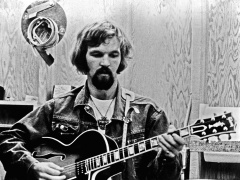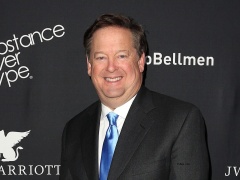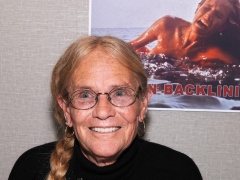
Louise Fletcher, who won the best actress Oscar for her indelible performance as Nurse Ratched in Milos Forman’s “One Flew Over the Cuckoo’s Nest,” died Friday at her home in France, according to a rep. She was 88.
The classic film, based on Ken Kesey’s novel and exploring the repressive tendency of authority through the story of the patients and staff of a psych ward, won five Oscars in 1976, including best picture and best actor for Jack Nicholson.
“One Flew Over the Cuckoo’s Nest” was the first film in more than four decades to sweep the major categories of best picture, director, actor, actress and screenplay. It was nominated for an additional four Oscars and was also a substantial box office hit.
In the American Film Institute TV special “AFI’s 100 Years… 100 Heroes & Villains,” Fletcher’s Nurse Ratched was named the fifth-greatest villain in film history — and second-greatest villainess, behind only the Wicked Witch of the West.
Ironically, the Ratched character had been softened in the script compared to Kesey’s original, and Fletcher gave a rather subtle performance, often conveying the character’s emotions simply through facial expressions, which is why she deserved her Oscar in the first place. Indeed, the actress even enables us to feel sorry for Ratched at more than one key moment in the film.
In a 2003 reappraisal of “Cuckoo’s Nest,” Roger Ebert declared that despite the Oscar, Fletcher’s performance “is not enough appreciated. This may be because her Nurse Ratched is so thoroughly contemptible, and because she embodies so completely the qualities we all (men and women) have been taught to fear in a certain kind of female authority figure — a woman who has subsumed sexuality and humanity into duty and righteousness.”
It could be argued, however, that the role of Nurse Ratched and the Oscar the actress earned for that performance ultimately did Fletcher more harm than good: In a review excoriating the horror film “Flowers in the Attic,” in which the actress starred in 1987, a frustrated and unsympathetic Washington Post writer opined, “Fletcher should talk to her agent about these stereotyped ‘evil’ roles, in which she has become increasingly tedious.”
But Fletcher may well have beseeched her agent for a greater variety of roles to no avail.
She had most recently appeared in the 2013 feature “A Perfect Man,” starring Liev Schreiber and Jeanne Tripplehorn.
On TV Fletcher had played family matriarch Peggy “Grammy” Gallagher, a cunning ex-con who nevertheless wanted a relationship with her grandchildren, on Showtime’s “Shameless.” The actress recurred on “Star Trek: Deep Space Nine” as the scheming, duplicitous spiritual leader Winn Adami from 1993-99, on cult sci-fier “VR.5” from 1995-97 and on “ER” in 2005.
She was Emmy nominated for guest roles on “Picket Fences” in 1996 and on “Joan of Arcadia” in 2004.
Fletcher had returned to acting in 1974 after more than a decade away raising a family and gave a supporting performance in Robert Altman’s “Thieves Like Us” that Pauline Kael called “impressively strong,” but the actress did not have a high profile in Hollywood when she was cast as Ratched.
Angela Lansbury, Anne Bancroft, Ellen Burstyn, Colleen Dewhurst and Geraldine Page had all turned down the Ratched role, each afraid of the possible effect on her career.
Director Milos Forman chanced to see Fletcher in “Thieves Like Us.”
“She was all wrong for the [Ratched] role, but there was something about her,” Forman later wrote in his memoir. “I asked her to read with me and suddenly, beneath the velvety exterior, I discovered a toughness and willpower that seemed tailored for the role.”
Fortunately, there were some opportunities to escape the typecasting.
She acquitted herself well in the 1978 noir spoof “The Cheap Detective,” starring Peter Falk.
In the 1979 drama “Natural Enemies,” she starred with Hal Holbrook, playing a husband who murders his family. Critic Richard Winters wrote that Fletcher is “quite good playing the polar opposite of her Nurse Ratched character. Here she is vulnerable and fragile instead of rigid and authoritative and even has a scene inside a mental hospital as a patient. The fact that she can play such different characters so solidly proves what a brilliant actress she is.”
In 1999’s “Cruel Intentions,” she played a genial, warm-hearted Long Island aristocrat.
Other film credits include “Exorcist II: The Heretic,” starring with Richard Burton and Linda Blair; sci-fier “Brainstorm,” with Christopher Walken and Natalie Wood; “Firestarter,” starring a young Drew Barrymore; and “2 Days in the Valley.”
Estelle Louise Fletcher was born in Birmingham, Alabama. Her parents were Deaf; she was introduced to acting by the aunt who taught her, at age 8, to speak. Fletcher attended the University of North Carolina; after taking a cross-country trip, she became stranded in Los Angeles and soon stumbled into acting.
The young actress made her screen debut in 1958 with appearances on “Playhouse 90,” among other television shows. The next year she guested on “Maverick,” “77 Sunset Strip” and “The Untouchables.” She appeared on “Perry Mason” twice in 1960, but by 1963 she had abandoned her career, at least for the time being, after making her feature debut in “A Gathering of Eagles.”
In 1973, after raising her children, she resumed her profession with a guest appearance on “Medical Center.” After doing a TV movie, she was cast in a supporting role in “Thieves Like Us” — a movie her husband, Jerry Bick, was producing.
Fletcher’s life story helped serve as the inspiration for one of the main characters in Robert Altman’s classic 1975 film “Nashville” and was set to play the character when Bick and Altman had a falling out.
Fletcher was married to Bick, a Hollywood literary agent who was also later a producer, from 1959-78. He died in 2004. She is survived by her sons John Dashiell Bick and Andrew Wilson Bick.






